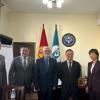Search
Displaying Results 1 - 25 of 141
Innovation has huge potential to drive sustainable development if supported by a vibrant innovation ecosystem. This requires effective linkages and collaboration at national level, and an innovation culture nurtured by a system of support to start ups and institutions such as business incubators.
Trade facilitation is a key priority for Kyrgyzstan and its trading community for participation in the global and regional trading system. Under the project on “Strengthening the capacity of the Kyrgyzstan National Trade Facilitation Council to implement the WTO Trade Facilitation Agreement”, UNECE
For the second time under the UNECE/FAO project “Accountability Systems for Sustainable Forest Management in the Caucasus and Central Asia”, Kyrgyz stakeholders met to advance their national criteria and indicator set for sustainable forest monitoring. This exercise is especially important as
Sustainable forest management indicators developed through a participatory process can provide important information on forest resources and support evidence-based forest policies. The concept of criteria and indicators, integrating social, economic and ecological aspects, was developed
Since 2009 when Public-Private Partnerships (PPPs) were introduced in Kyrgyzstan, 66 projects have been implemented in the country, providing access to critical public services to more than 1 million citizens. These PPP projects are the driving forces of the economic and social development in
Did you know that air pollutants come from numerous human activities, such as transport, agriculture, and industry? But even when we repaint our house, have our clothes dry-cleaned or when we make a charcoal barbecue, air pollutants are released. Knowing where exactly air pollutant emissions are
Kyrgyzstan is a landlocked transition economy, like other Central Asian countries. According to the World Bank’s 2018 Doing Business report, the cost for documentary, domestic transport and border formalities for one export shipment is USD 590. Reductions in time and cost can contribute to
While emissions of key air pollutants have been reduced considerably over the past few decades as a result of integrated air pollution management strategies developed under the Convention on Long-range Transboundary Air Pollution (Air Convention), progress has been uneven across the UNECE region
Kyrgyzstan has been one of the pioneers of Public-Private Partnerships (PPP) in Central Asia, with the introduction of a PPP model in its legal and regulatory framework since 2009, and the most recent PPP legislation enacted in 2021. On the back of this PPP experience, the Government has launched
A large, multidisciplinary team of international experts under the leadership of UNECE is working in Bishkek, assessing the environmental performance of the country by examining developments during the past decade.
The third review of Kyrgyzstan measures progress made and considers challenges
As part of broad support to countries’ sustainable energy transition, a field project implemented by UNECE has introduced a cost-effective green technology-solution in rural Kyrgyzstan. A new biogas unit, launched in September 2018, delivers concrete renewable energy solutions for a rural
The COVID-19 pandemic stopped trade routes, disrupted supply chains, and impacted international trade globally. Kyrgyzstan is no exception. According to its Ministry of Economy, Kyrgyzstan’s international trade decreased by more than 22% in the first half of 2020 compared to the same period in
The COVID-19 pandemic stopped trade routes, disrupted supply chains, and impacted international trade globally. Kyrgyzstan is no exception. According to its Ministry of Economy, Kyrgyzstan’s international trade decreased by more than 22% in the first half of 2020 compared to the same
Despite a marked overall improvement over the last ten years of the economic picture in Bishkek, Kyrgyzstan, urban planning lagged, and the development of basic and social infrastructure did not keep up with population increase, particularly in informal settlements. According to estimates shared
On 10 November in Bishkek representatives of UNECE, the United Nations Development Programme (UNDP) Bishkek Office and the Kyrgyz and Kazakh authorities discussed and approved the Global Environment Facility- funded project, “Enabling Transboundary Cooperation and Integrated Water Resources
In April 2018, the Eurasian Economic Commission adopted a decision requesting its members to use a risk-based approach for enforcement activities. Efforts towards effective risk management are particularly important in a country like Kyrgyzstan. The 2017 World Risk Report ranks Kyrgyzstan as
Four years ago, the countries in the Caucasus and Central Asian region pledged to restore more than 3 million hectares of degraded forests by 2030 under the global Bonn Challenge. To support them in turning their pledges into reality, the United Nations Economic Commission for Europe (UNECE) and
The Government of Kyrgyzstan has stressed the necessity to enhance its national innovation system as one of the priorities of its National Sustainable Development Strategy for the period 2013-2017. The strategy has highlighted the need to strengthen linkages between, on the one hand, the
Improving energy efficiency is one of the most cost-effective options for climate action and to meet growing energy demand in most countries. It contributes to energy security, a better environment, improved quality of life, and economic well-being. Out of all sectors of economic activity, the
Sound emission inventories are the first step for designing effective clean air policies as they provide information about the main sources and the most acute air pollution problems in a country.
Under the Convention on Long-range Transboundary Air Pollution (Air Convention), UNECE has therefore
Innovation, in the long run, is the single most important driver of economic growth. This is true for the most advanced economies, where innovation means the commercialization of cutting-edge technologies. It is also true for less advanced economies, where innovation primarily means the adoption
Policy solutions for pressing problems like air pollution require sound data. Emission inventories can help in determining the major sources of air pollution in a given country.
As a result of integrated air pollution management strategies developed under the UNECE Convention on Long-range
Forest ecosystems in the Caucasus, Central Asia and Eastern Europe are struggling with the complexity of changing climatic conditions, human and natural pressures threatening their vitality and resilience.
To address these challenges and promote sustainable forest management, data on forest
Improving energy efficiency is a cost-effective means to support economic development while contributing to climate action. On a national scale, energy efficiency helps strengthen energy security, reduce energy expenditure, slow down energy demand growth, reduce investment needs for new generation
Buildings are a major emitter of CO2 and a major energy consumer. Radical changes to the design and construction of buildings, to retrofitting of existing building stock, and to the way energy is supplied and used in buildings are critically important if UNECE member States wish to meet their














